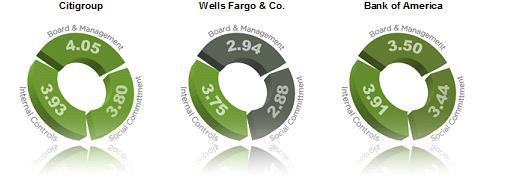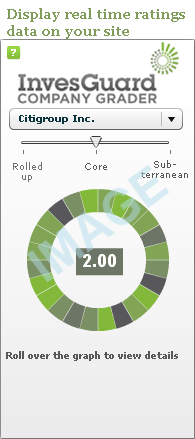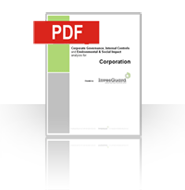June 2nd, 2010
The American Recovery and Reinvestment Act of 2009 (”ARRA”) and the associated guidance issued by the U.S. Department of the Treasury requires financial institutions that have sold preferred stock and issued a warrant to the U.S. Treasury Department under the Capital Purchase Program to permit a separate shareholder vote to approve the compensation of executive officers.
The Securities and Exchange Commission has also issued guidance that requires participants in the Capital Purchase Program to annually submit to their shareholders a proposal to approve the executive compensation arrangements as described in the Compensation Discussion and Analysis of an issuer’s proxy statement.
Besides companies that are statutorily required to provide shareholders an opportunity to vote on executive compensation practices, there are a few other companies that have initiated this practice voluntarily. InvesGuard did a quick exercise on the number of banking companies from the S&P 500 that presented an advisory vote on executive compensation (‘Say on Pay’ ) to their shareholders between May 12th 2009 and May 12th 2010.
Only 16 banks presented some matter or the other to their shareholders for a vote during this period. Out of these 16 companies, 12 companies actually presented a proposal for shareholders to approve a non binding vote on executive compensation. Shareholders from all 12 banks easily approved this vote. The most overwhelming percentage of votes for executive compensation were at M&T Bancorp where 97% of the total votes were ‘For’ this proposal. The lowest percentage of ‘For’ votes was at Wells Fargo (WFC) where only 72% of the total votes, approved the ‘say on pay’ proposal. This is not surprising considering that earlier this year, soon after exiting the TARP program, WFC announced a revamped, higher compensation structure for its senior management.
Out of these 12 banks, 5 have already exited the Capital Purchase Program and have continued to provide the ‘Say on Pay’ vote to their shareholders.
A similar exercise for Investment Brokerage, Asset Management, credit services and other related companies for the largest 3500 companies (by market cap, excluding closed-end funds) was conducted. In this case there were only 41 companies that presented some matter or the other to their shareholders for a vote between May 12th 2009 and May 12th 2010. Out of these 41 companies, only 8 companies presented the ‘say on pay’ vote to shareholders. Shareholders at 7 of these 8 companies passed the ‘say on pay’ vote. 60% of shareholder votes at Wadell and Reed Financial Inc were against a stockholder proposal requiring the board to accept a proposal that would seek an advisory vote of shareholders to ratify and approve executive compensation.
Providing shareholders the right to an advisory vote on executive compensation was expected to boost shareholder rights. But, looking at the dismal number of companies that are providing shareholders with this right to vote on executive compensation it seems highly unlikely that it is going to have any far reaching consequences.
please wait...
Rating: 0.0/5 (0 votes cast)
Tags: Say on Pay
Posted in Pay regulation | No Comments »
April 19th, 2010
Lately, Citigroup appears to be putting its best foot forward. Its CEO provided a very confident (albeit doubtful) front during the recent congressional hearings held by the Oversight Panel for TARP. President and CEO of Citi Mortgage Mr. Sanjiv Das also appeared reasonably confident in Citi’s ability to ‘assist’ underwater homeowners in the recent House Financial Services Committee hearing.
It appears that these Citigroup executives are not too far from the mark…and not just based on their behavior or how confident they were at congressional hearings. Based on recent SEC filings and published information, Citigroup appears to have taken a lead over both Bank of America and Wells Fargo so far as InvesGuard’s non financial scores are concerned.
Look at InvesGuard scores for Citigroup, Bank of America and Wells Fargo below:

A legend of the scores and what they mean has been included at the end of this post.
InvesGuard scores and grades companies based on non-financial information. Different parameters are considered including:
1. Number of transactions between the company and its directors (other than director fees) that may give rise to conflict of interest situations.
2. Directors who also perform consulting services for the company resulting into reduced Director Independence.
3. Level of transparency in Board Audit Committee reports.
4. Relevance of experience of Board members especially those who hold Board level finance, credit and risk committee positions in the financial industry.
5. A look at the quality of a company’s guidelines, charters, principles etc under which it operates.
6. Social and environmental factors such as lending practices, emissions, waste management, recycling etc.
For 2009, Citigroup’s chief area of improvement has been its Board of Directors. Although concerns continue over some aspects, the Citigroup Board is stronger than it used to be. Out of 9 parameters or ‘Core’ comparison events between Bank of America, Citigroup and Wells Fargo, Citigroup has scored the highest or shared the highest score for 7 of these ‘core’ events. These core events include such parameters like CEO and senior management effectiveness, aligned director shareholder interests etc.
Of the three companies, Wells Fargo has by far performed the worst on the Board of Directors and Senior Management front. Its poor scores will get even worse for 2010 with the jump in CEO and senior executive pay without any apparent long term strengthening of shareholder value. Hitting it the hardest, is Wells’ absence of a Board level Asset Quality committee. Even its Board level Finance and Credit committees appear to have some directors with less than relevant experience.
InvesGuard’s Internal Control Environment primarily includes a comprehensive review of a company’s Board Audit Committee including quality of this committee’s reports, its members, their compensation, as well as its charter. Conflict of Interest is also considered within the Internal Control Environment category.
For 2009, all three companies did not explicitly prevent their directors from providing consulting services to each of these companies. Providing consulting services has the potential to take away the independent perspective that directors are expected to provide. It could potentially cloud their judgement. In fact, Citigroup paid consulting fees of $100,000 to Director Joss during 2009 in addition to regular director compensation.
For more detailed information on these scores please visit our store at http://store.invesguard.com/ or send me an email at tejus@invesguard.com
Check back later this week when we will be adding final 2009 JP Morgan Chase and Goldman Sachs scores.
Legend for the scores used in the graphs

please wait...
Rating: 1.1/5 (7 votes cast)
Tags: 2009 InvesGuard Scores, Bank of America, Citigroup, Wells Fargo
Posted in 2009 InvesGuard Scores, Bank of America, Citigroup, Pay regulation, TARP Repayment, Uncategorized, Wells Fargo, company | No Comments »







